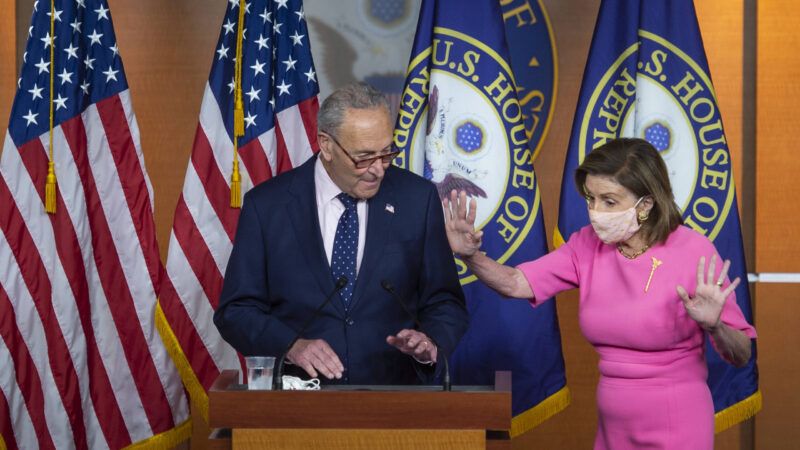Democrats Have a Lot of Bad Ideas for Tax Reform
Careful, thoughtful policy making is not ruling the day.

Passing an enormous, (theoretically) paid-for spending bill that pleases all the various factions within the Democratic Party was never going to be easy. But the current framework that Democrats have unveiled—where party leaders determine what revenue raisers to use by throwing them at a wall like spaghetti and seeing what sticks—is downright disastrous.
This slapdash approach is par for the course nowadays for Congress. Passage of the 2017 Tax Cuts and Jobs Act (TCJA) was marred by last-second additions and changes, as well as funky accounting to pass muster by reconciliation rules. Even before this year, Congress was not exactly known for fostering the development of careful, thoughtful policy making.
But the process behind trying to "pay for" this year's reconciliation bill has taken things to a whole new level. Ideas that were half-baked from the beginning have arisen only to collapse under their own weight, with each attempt dropping more quickly than the last. It would almost be amusing if it didn't relate to important national fiscal policy.
Take the latest proposal by Sen. Ron Wyden (D–Ore.) to establish a "billionaires tax" by imposing a so-called mark-to-market regime of taxing unrealized capital gains for the wealthiest taxpayers. Doing so would not only have been an administrative nightmare for an IRS that is already demanding a massive expansion to its budget to fight tax evasion, but also likely would have wreaked havoc on markets as hundreds of the largest shareholders sold large portions of their holdings just to pay their tax bills.
The idea was promptly put aside, with Wyden's proposal not even lasting a full 24 hours before being pronounced dead. In any functional policy-making environment where legislation is being created by level-headed adults who have the goal of extracting the necessary amount of revenue with the minimum economic harm and additional tax complexity, this never would have happened.
Democrats are instead having the equivalent of a messy Facebook fight, openly airing their dirty laundry in the hopes of achieving their policy priorities through overwhelming public support and positive press. When that fails to materialize, they grumpily return to glaring at each other.
Another example: the since-aborted attempt to sneak an unprecedented expansion of the IRS's power to monitor taxpayers' finances into the reconciliation bill. Pushed by the Treasury Department, the original proposal would have required financial institutions to report data from accounts with annual gross inflows and outflows exceeding $600 total. Though the proposal technically only provided the IRS with data on gross numbers, the IRS could potentially have used its audit power to evaluate specific transactions.
Responding to the backlash over this attempt to monitor just about every account, the proposal was revised to raise the threshold to $10,000, with payroll deposits and spending up to that level exempted. Yet even this would have roped in Americans making cash-tipped wages, about half of small business owners, anyone selling tax-exempt used items, and someone making a large purchase after saving up for years, to name a few examples. By any metric, it would have caught millions of average-income Americans in its dragnet.
That proposal appears to be dead in the water as well after swing-vote Sen. Joe Manchin (D–W.Va.) accurately described it as "screwed up." But the question remains of how it got as far as it did—not only was the proposal itself fundamentally flawed, but it does not appear a necessary vote like Manchin was consulted beforehand.
While some of the worst ideas have been filtered out, the current framework has more than its fair share of bad ideas. For example, a proposed excise tax on corporate stock buybacks strikes at a common source of progressive angst, but there's really no good policy reason to discourage buybacks through the tax code.
Then there's proposals for a minimum corporate book tax. Populist claims that the tax code is rigged in favor of corporations are inaccurate—the deductions corporations use to lower their tax bills enjoy bipartisan support in Congress and corporate tax revenues this year are projected to be around the level they were projected to be this year prior to the passage of the 2017 tax cuts. But even if corporations were getting off scot-free, there are much more straightforward, less clunky ways to handle the issue, such as by modifying tax rates.
It's too late in the game to maintain any naivete about whether Congress can be trusted to responsibly shepherd taxpayer funds and maintain a fair and competitive tax code. But taxpayers should at least demand better than this slipshod approach of putting forward as many ideas as possible and seeing what can get passed.
While TCJA had some slapdash ideas attached through the congressional bargaining process, it largely achieved its goal of lowering rates and producing a less complex tax system. The slate of half-baked goods that Congress is preparing to present to American taxpayers would make sure that the tax system will need another overhaul sooner rather than later.
Show Comments (177)